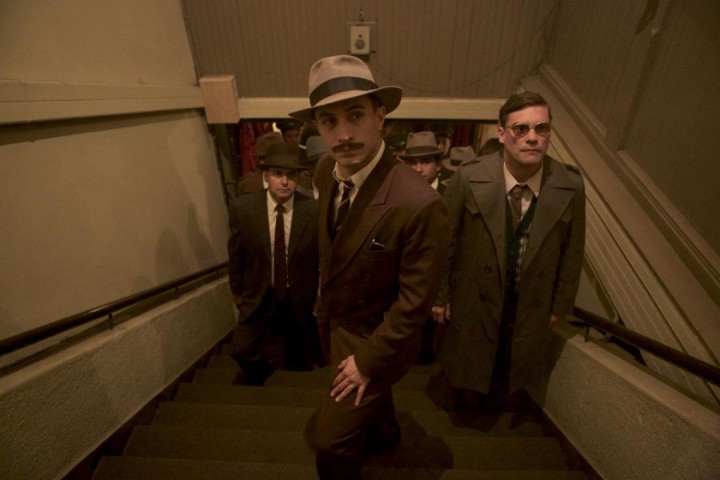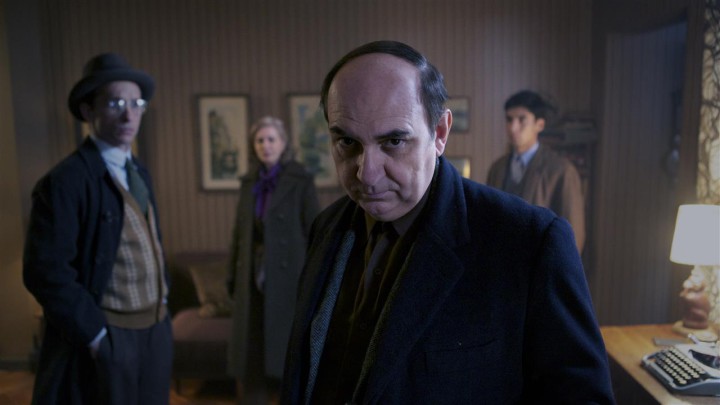In Pablo Larraín’s Neruda, form follows function. Rather than a straightforward biopic, Larraín has crafted a work of cinematic poetry that evokes emotional reality as opposed to factual representation. The resultant film blends comedy and social criticism without missing a beat, while the director makes his point through style as much as story. The details of famed Chilean poet and communist senator Pablo Neruda’s 1948 flight from governmental persecution are more or less true as depicted, but that’s just a starting point from which Larraín spins a playful, fantastical tale that delves into the heart of mythologization and the internal processes of the creative mind.
Neruda sticks loosely to the facts of the poet’s ouster from government and the subsequent year spent shuffled between safe-houses, in hiding from anti-communist authorities as he struggled to find a way across the Chilean border. But Larraín’s divergences from literality are far more interesting — both to the audience and the director — than the facts of the narrative, beginning with the notable addition of fascist police inspector Oscar Peluchonneau (Gael Garcia Bernal), whose pursuit of Neruda (Luis Gnecco) drives the narrative.
The film initially bears the trappings of a standard issue political thriller, but with the introduction of Bernal’s Peluchonneau, the film shifts into something closer to a satirical take on the film noir conventions appropriate to the period. Bernal sports the requisite fedora and pencil-thin mustache, and his hard-boiled voiceover narration becomes a commentary on Neruda’s art and actions, as well as something of a running gag that passes satire and reaches farcical levels by the third act. As Gnecco’s baby-faced Neruda cavorts with orgiastic entitlement ill-befitting a good communist and persistently tests the party loyalists risking their lives to keep him safe, the cheap crime novels he devours tip us off to the true nature and purpose of Peluchonneau’s character long before the film states these truths overtly on its way into the final act.
Larraín begins to toy with the audience through formal conceits almost immediately. Conversations continue seamlessly over jump-cuts to completely different stagings, even though no time has passed and the characters speaking could not possibly have changed their locations so drastically unless they stopped talking in mid sentence solely so they could reposition themselves. Peluchonneau never sets foot in a car unless it’s in front of the awkward rear-projection backdrops common to the films from which he seems to have been lifted. There are no grandiose statements of hero-worship here, although Larraín clearly bears a very deep affection for Neruda. Instead, we have a warmhearted depiction of a flawed human being who succeeded not only on the basis of his own talent, but on the need of his people for a voice.
 There’s a secret (though few will be shocked by its revelation) about Peluchonneau that underscores Larraín’s intentions with Neruda. If his thematic palette skews dark, his tonality is anything but. Don’t expect a somber examination of fascist authority and the struggle of creativity to affect political change, although such ideas are certainly present. This film is far too clever to express such truths through banal genre cliches. What Larraín accomplishes here is more subtle, entertaining and affective — and therefore infinitely more powerful in its capacity to address the horrendous repression of civil liberties that its historical basis entailed than any straightforward recounting of the facts could ever be. Rated R for sexuality/nudity and some language. Spanish with English subtitles.
There’s a secret (though few will be shocked by its revelation) about Peluchonneau that underscores Larraín’s intentions with Neruda. If his thematic palette skews dark, his tonality is anything but. Don’t expect a somber examination of fascist authority and the struggle of creativity to affect political change, although such ideas are certainly present. This film is far too clever to express such truths through banal genre cliches. What Larraín accomplishes here is more subtle, entertaining and affective — and therefore infinitely more powerful in its capacity to address the horrendous repression of civil liberties that its historical basis entailed than any straightforward recounting of the facts could ever be. Rated R for sexuality/nudity and some language. Spanish with English subtitles.
Opens Friday at Grail Moviehouse.








Before you comment
The comments section is here to provide a platform for civil dialogue on the issues we face together as a local community. Xpress is committed to offering this platform for all voices, but when the tone of the discussion gets nasty or strays off topic, we believe many people choose not to participate. Xpress editors are determined to moderate comments to ensure a constructive interchange is maintained. All comments judged not to be in keeping with the spirit of civil discourse will be removed and repeat violators will be banned. See here for our terms of service. Thank you for being part of this effort to promote respectful discussion.